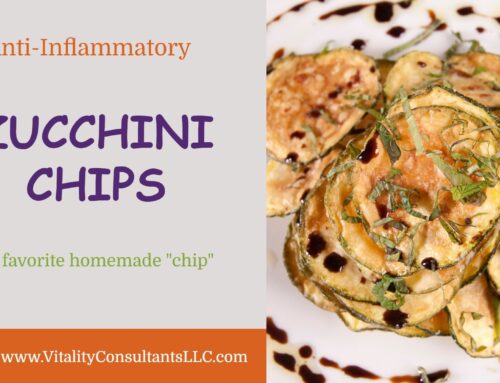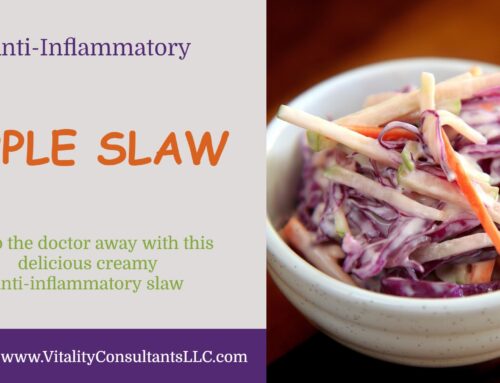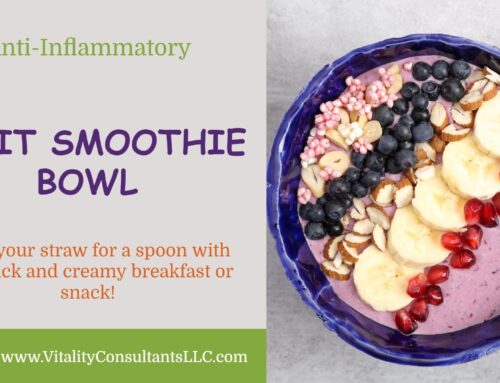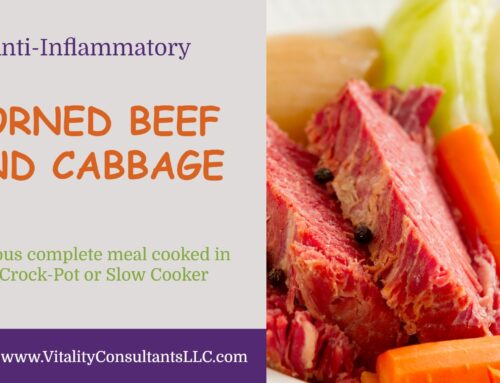Is Keto Anti-Inflammatory?
Keto, or the ketogenic diet, involves following a low carbohydrate, high fat and high protein diet plan. Keto has similarities to the Atkins diet, which rose to fame in the 1990s. So, we ask, is keto anti-inflammatory? In clinical trials, keto has shown some promise for improving sugar levels in diabetic patients1; in this article, we will investigate whether keto also has anti-inflammatory benefits.
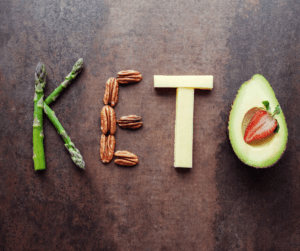
How Does Keto Work?
Following the high fat, low carbohydrate keto diet is thought to encourage the body to enter a state known as ketosis. In ketosis, the body can more efficiently burn fats to provide the energy we need for our everyday biological functions. As the body starts to use fats as its energy source, weight loss begins to occur. Type 2 diabetic patients have also seen better control of their blood sugar levels and reduced insulin levels.2
These findings are positive for anyone looking to lose weight or take control of their diabetes.3 Additionally, scientists are now starting to investigate whether following keto could also help to reduce inflammatory processes within the body. While some may find the keto diet too restrictive, those who can stick to it as a lifestyle may reap significant benefits.
What is Inflammation?
Inflammation is a natural process in which the body’s white blood cells are activated to protect us against foreign bodies, including viruses or bacteria. Aside from infection, inflammatory responses can also be mounted in conditions including arthritis, asthma and heart disease.4
Although inflammation is a crucial defense mechanism that helps fight off infections, when inflammatory processes continue after the initial trigger has gone, it can lead to unpleasant symptoms. Muscle and joint pains, breathlessness, headaches and tiredness can all be caused by chronic inflammation.4
Does Keto Reduce Inflammation?
 A study in 2017 found that an artificial keto diet caused a biological mechanism that reduced inflammation in the brain following a head injury.5 Reducing inflammation in these patients is vital for preventing long term brain damage. However, with many people in the population suffering from inflammation elsewhere in the body, this finding could also help patients with other conditions reduce their symptoms.
A study in 2017 found that an artificial keto diet caused a biological mechanism that reduced inflammation in the brain following a head injury.5 Reducing inflammation in these patients is vital for preventing long term brain damage. However, with many people in the population suffering from inflammation elsewhere in the body, this finding could also help patients with other conditions reduce their symptoms.
Scientists have found that some food groups are more likely to cause inflammation. Look at these foods to see if keto is likely to reduce inflammation by its restrictive nature.
Refined Carbohydrates
Refined carbohydrates, including sweets, bread, pasta, and cakes, may all encourage inflammatory gut bacteria growth. This can increase your risk of both obesity and inflammatory bowel disease.6 As keto dictates that minimal carbohydrates are eaten, this may help to reduce inflammation levels.
Sugars
A diet that is high in sugar can lead to increased inflammation. Scientists have found that high sugar levels can cause inflammation within the blood vessels, increasing heart disease risk. Drinking regular soda, which is high in sugar, can increase levels of uric acid. This can lead to gout, a painful form of inflammatory arthritis.6 As sugar is best avoided on keto, inflammatory risk may also be reduced.
Fruits and Vegetables
Intake of certain fruits and vegetables is limited when following keto as some contain high levels of carbohydrate. There is evidence that some vegetable oils promote inflammation due to their high omega-6 fatty acid content.6 Avoiding these as part of keto may therefore be of benefit.
Final Thoughts
Is keto anti-inflammatory? Following keto can lead to successful weight loss and lowering of blood sugars for those who can stick to the diet. There is also early evidence that it may reduce inflammation as a result of eliminating causative food groups and through more complex biological mechanisms. However, further long-term studies are required for more conclusive results.
Recipes
We couldn’t leave you hanging without a keto recipe to get you started.
This Spaghetti Squash Pizza Casserole is such a hit at my house, I just had to share it. The recipe looks a little daunting but don’t let it be! Once the spaghetti squash is prepared, the rest comes together in a snap!
These pictures will show you the progress your casserole makes as you put it together:
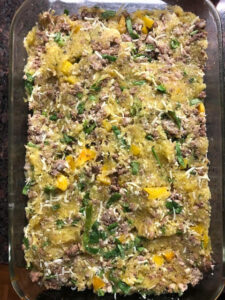
Preparing the “crust”
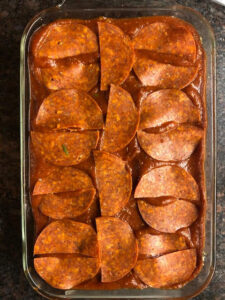
Adding sauce and pepperoni
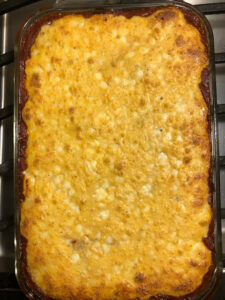
The finished casserole
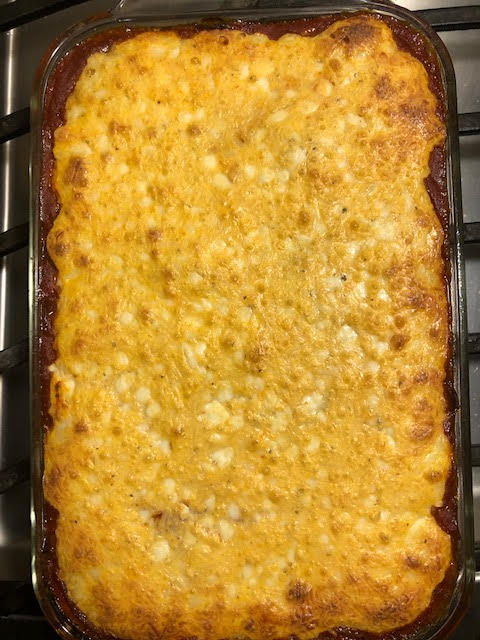
Spaghetti Squash Pizza Casserole
Ingredients
"Crust"
- 1 medium spaghetti squash
- 1 Tbsp olive oil
- ¼ lb ground beef, turkey or chicken
- ¼ lb Italian sausage
- ¼ yellow pepper diced
- 2 Tbsp sliced green onions
- 1 cup packed chopped fresh spinach
- 1 egg beaten
- ½ cup shredded mozzarella cheese
- ¼ cup parmesan cheese
- Salt, pepper and garlic powder to taste
- Non-stick cooking spray
Topping
- 15 oz jar of marinara sauce no added sugar
- Basil and oregano to taste
- 10 large slices pepperoni halved
- 1 cup cottage cheese
- 1 cup mozzarella cheese
- ¼ cup parmesan cheese
- 1 egg beaten
Instructions
How to cook the spaghetti squash
- Preheat oven to 350°F and line a baking sheet with parchment paper.
- Pierce the spaghetti squash with a knife about 4 times on all sides. Place squash on a microwave safe plate and cook for about 4 minutes. Once cool enough to touch, slice squash in half lengthwise and remove seeds. Rub both sides of squash with olive oil and sprinkle with salt, pepper and garlic powder. Place squash cut side down on prepared baking sheet and cook in oven for 30- 40 minutes, or until tender to the touch. Remove from the oven and flip the squash so that it’s cut side up. Set aside to cool.
- Remove the parchment paper from your baking sheet and line sheet with paper towels. Using a fork, scrape the strands out of the squash shell from the outside in and discard shell. Place squash on paper towels and allow moisture to drain from strands. Before continuing, squeeze remaining moisture from squash with additional paper towels. This is very important, so your casserole is not watery.
Preparing the casserole
- While spaghetti squash is cooking, place ground beef and sausage in a skillet and sauté until cooked through. Drain grease.
- Spray a 7 x 11” or 9 x 13” baking dish with cooking spray.
- Place squash in a large bowl and add all remaining “crust” ingredients. Mix until well combined. Add mixture to baking dish and smooth with a spoon into an even layer.
- Using the same bowl, combine marinara sauce with basil and oregano if needed. Top the crust with the sauce. Top the sauce with the pepperoni slices.
- In the same bowl, mix cottage cheese, mozzarella, parmesan and egg. Smooth in a layer over pepperoni.
- Bake 30-40 minutes, or until sauce is bubbling and cheese layer is melted. Cut into squares and serve hot.
Want free anti-inflammatory recipes, downloadable resources and efficiency tips and tricks from a professional chef? Of course, you do! Click here for the secret sauce!
References
1 Melroy S. D’Souza et al. From Fad to Fact: Evaluating the Impact of Emerging Diets on the Prevention of Cardiovascular Disease. https://doi.org/10.1016/j.amjmed.2020.05.017
2 https://www.healthline.com/nutrition/ketogenic-diet-101#what-it-is
4 https://www.webmd.com/arthritis/about-inflammation
5 https://www.ucsf.edu/news/2017/09/408366/how-ketogenic-diets-curb-inflammation-brain
6 https://www.healthline.com/nutrition/6-foods-that-cause-inflammation



